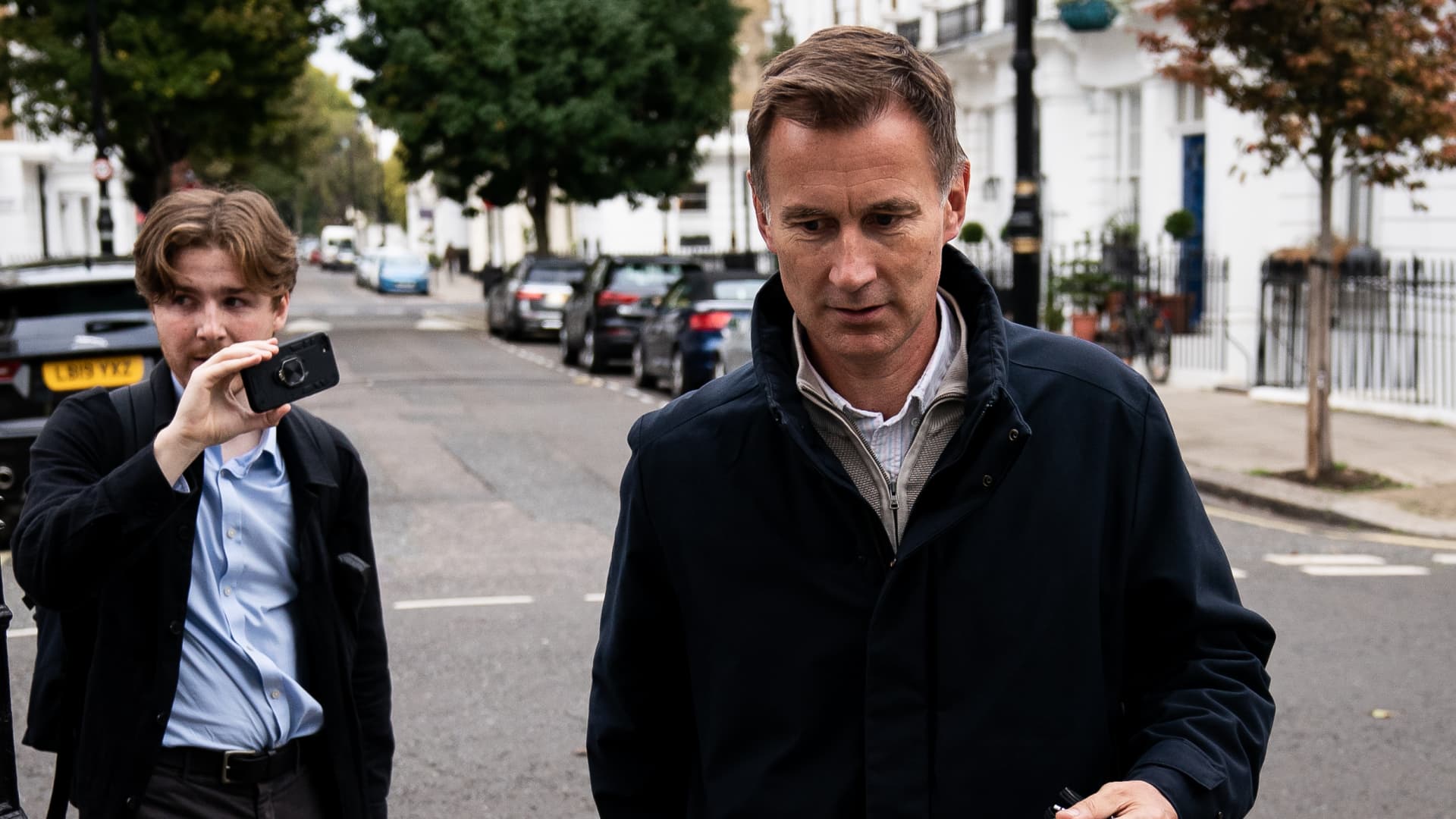British pound rises as new UK finance minister brings forward policy announcements to today

Jeremy Hunt arrives at his home in London after he was appointed Chancellor of the Exchequer following the resignation of Kwasi Kwarteng. Picture date: Friday October 14, 2022.
Aaron Chown | Pa Images | Getty Images
LONDON — Sterling rose against the dollar on Monday morning after new U.K. Finance Minister Jeremy Hunt announced he would deliver parts of his medium-term fiscal plan later in the day.
The pound was up around 0.8% to $1.1259 by around 9 a.m. London time, extending gains after the statement from the U.K. Treasury. Within the hour, the currency had started to settle at $1.1170.
Yields on long-dated U.K. government bonds, known as gilts, have also fallen after an unprecedented sell-off which prompted the Bank of England to intervene and stabilize the market in the two-week period leading to Oct. 14. Yields move inversely to prices.
Yields on 10-year gilts fell 30 basis points to trade around 4.029% by 9 a.m. London time. Yields on the 5-year fell to 4.013% and 2-year gilts slipped to 3.663%.
The market moves follow a dramatic day in British politics on Friday, which included big fiscal U-turns from Prime Minister Liz Truss and the sacking of Finance Minister Kwasi Kwarteng. He was swiftly replaced by Hunt, who is expected to make a statement at 11 a.m. local time on Monday.
The announcements Monday would come two weeks ahead of schedule. However, the full medium-term fiscal plan is still set to be published on Oct. 31, accompanied by a forecast from the independent Office for Budget Responsibility — something that was lacking in the original mini-budget announced on Sept. 23 which roiled U.K. bond markets.
Hunt said over the weekend that his priority as finance minister is growth, much like his predecessor, but he highlighted it would be “underpinned by stability.”
“The drive on growing the economy is right – it means more people can get good jobs, new businesses can thrive and we can secure world class public services. But we went too far, too fast,” Hunt said in a statement released Saturday.
In a research note Monday morning, Kit Juckes from Société Générale said the message the U.K. government now wants to send to the markets is “nothing to see here, please go about your normal business.”
“I’m not sure it will be quite that simple, but gilt yields should fall, sterling volatility should melt away and all we’ll be left with will be recession, austerity, higher rates and a lingering sense that this sterling crisis, more than its predecessors, was homemade and avoidable,” he added.
Biden: Original plan was ‘a mistake’
The International Monetary Fund gave a damning verdict on the swathe of debt-funded tax cuts after they were first announced in late September. U.K. bonds saw a sharp sell-off and the pound hit a record low in the days afterward.
In a rare statement, the IMF said the plans laid out by the U.K. would “likely increase inequality” and it stressed it does “not recommend large and untargeted fiscal packages at this juncture.”
U.S. President Joe Biden weighed in on the British economy over the weekend, describing Truss’s now-abandoned tax cut plan as a “mistake” and expressing concern that other nations’ monetary policies could hurt the United States.
“I wasn’t the only one that thought it was a mistake,” Biden said. “I disagree with the policy, but that’s up to Great Britain.”
Biden also said it was “predictable” that Truss had to backtrack the plans. He spoke to reporters at an ice cream shop in Oregon on Saturday.
Pressure on Truss
On Friday, Truss announced a partial reversal of her so-called mini-budget, including the scrapping of a pledge to reverse a corporation tax hike. Corporation tax will now increase from 19% to 25% as originally planned by her predecessor Boris Johnson’s government.
“It is clear that parts of our mini-budget went further and faster than markets were expecting,” Truss said in a brief and hastily-arranged press conference on Friday.
Markets weren’t reassured by the move though, and the pound fell by around 1.1% against the dollar following Truss’s speech, trading at around $1.1205. Many political observers highlighted her poor performance Friday, piling yet more pressure on Truss with some lawmakers calling for her to step down, including members of her own party and leader of the opposition party, Keir Starmer.









